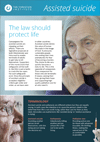A new poll has found that over half of the British public are against doctors euthanising patients by dehydration, if they have asked prior to incapacitation to be kept alive.
Under the Mental Capacity Act 2005, doctors can withdraw water from patients if it is deemed in their “best interests” and if they think death is approaching soon.
But the ComRes survey, commissioned by pro-life charity ALERT, shows that 58 per cent of people favour a change to this law.
They want patients – who request artificial hydration ahead of being incapacitated – to have their wishes upheld by doctors.
Disabled
Currently, patients can draw up a legal contract ordering doctors to withdraw water if they become incapacitated – but no provisions are made for patients to say in advance that they wish to be artificially hydrated in order to be kept alive.
The poll found that among the disabled the numbers supporting a change in the law rises to 61 per cent, and 62 per cent of those aged 65 and over want the legislation to be amended.
Baroness Masham of Ilton, a crossbench Peer, has said she intends to introduce a Private Member’s Bill into the House of Lords to amend the 2005 Mental Capacity Act so that people can request fluids in advance of losing any ability to communicate.
Baroness Masham said: “People should have the right to be looked after and to have food and fluid. I think it is terrible to deny these to people when they want them.”
Rights
The move is supported by disability rights activist Baroness Campbell of Surbiton who said: “Food and water are basic human rights”.
Baroness Campbell, who has suffered from spinal muscular atrophy since childhood, explained: “They should never be withheld merely because a patient is mentally incapacitated or believed to be near to the end of life.
“This research confirms what disabled people have been telling me for some time. Many are fearful that, if and when they lose capacity, food and water may be denied to them”, she added.
Interests
Ahead of the Mental Capacity Act coming into force, pro-life charities warned that withdrawing artificially provided hydration could never be in a patient’s “best interests”.
Nikki Kenward, of disability rights campaign group Distant Voices, said she believed the 2005 Act had “made water a medicine and care something we now have to hope for and can’t expect”.



